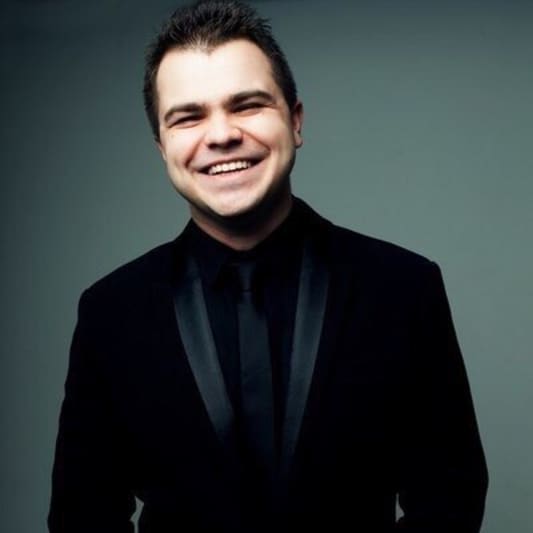
I worked for couple major cruise companies as houseband and cocktail piano player, so, I’m versatile in any kind of music from 1920s till now.
Professional piano/keys player for 15 years, master’s degree in sound engineering. I have extensive experience playing in bands and solo, can compose any accompanying or solo part for your piece or can read your sheet music. I also can provide midi-files and write charts for you.
My second instrument is bass guitar, so I can compliment my work with it.
Contact me through the green button above and let's get to work.
Endorse Henryk Lisowski1 Reviews
Interview with Henryk Lisowski
Q: Tell us about a project you worked on you are especially proud of and why. What was your role?
A: I worked on pop album as keyboard player, and then on remixes for full album, but in smooth-jazz style, as arranger and recording engineer.
Q: What are you working on at the moment?
A: I’m working on piano lo-fi hop album.
Q: Is there anyone on SoundBetter you know and would recommend to your clients?
A: Not yet, but I’m looking forward to make some great acquaintances
Q: Analog or digital and why?
A: Digital. If you ask me which piano do I want to play – stage digital or live grand, I’ll pick second one. But I’ll record it on digital storage. Why? Because I can send it for 10000 miles in matter of seconds. And quality of recording is not worse, and often better than analog. At least without hi-end monitoring. At least with my ears.
Q: What's your 'promise' to your clients?
A: I will never make your song sound worse. Not too much better – maybe. But definitely not worse.
Q: What do you like most about your job?
A: You learn to play, you get better and better, but you will never be “good enough”. It’s never-ending story.
Q: What questions do customers most commonly ask you? What's your answer?
A: – Can you play something for my song? – Absolutely. It’s the most common first question, and after that – I can’t really remember question that repeated at least 2 times. Well, maybe, “do you provide separate stems and midi?”. And answer is still “absolutely”
Q: What's the biggest misconception about what you do?
A: People think that “to play piano” means exactly the same as “to play video games”
Q: What questions do you ask prospective clients?
A: “Alright, let’s get to work, where do we start?”
Q: What advice do you have for a customer looking to hire a provider like you?
A: Reach out and talk. The worst enemy of humanity is misunderstanding.
Q: If you were on a desert island and could take just 5 pieces of gear, what would they be?
A: 1. Nord Stage 3 HA88 2. Decent Mac computer 3. Decent audio interface 4. Spare parts and maintenance kits 5. Diesel generator(!)
Q: What was your career path? How long have you been doing this?
A: I attended music school when I was 6, played just for myself and my friends. Then, when I was university student, I started to play for party bands. Then I worked for Philarmonics and became a band-leader of 13-piece variety symphonic orchestra. After it I got bored and decided to have an audition for cruise ships orchestras. I passed it and after several contracts I came back home to become session musician.
Q: How would you describe your style?
A: Smooth. Thrifty. Thick.
Q: Which artist would you like to work with and why?
A: With Cory Wong Orchestra. I like playing in big orchestras, it’s like energy is concentrating from a lot of people and shining like one beam. And his music is just awesome!
Q: Can you share one music production tip?
A: Music production is hard work. If you want to work – work hard. Don’t wait for inspiration, it will come.
Q: What type of music do you usually work on?
A: As orchestral musician I must be versatile, so if my client need big band style piano – I’m on it, contemporary R&B-like vibes – sure thing, 80’s funky stuff – let’s funk it out.
Q: What's your strongest skill?
A: Harmonization and accompaniment
Q: What do you bring to a song?
A: I bring freshness, fullness, make it more interesting, make it more spicy or more soothing. I enhance harmony, I make song sound completed.
Q: What's your typical work process?
A: 1. Listen to track I’m going to play for and for references (if provided), looking over sheet music (if provided), take notes. 2. Play along with track for couple times, very freely, feeling it. 3. Record 2-3 draft takes, listen for them, take notes. 4. Record fair takes. Make couple variants for my client to choose. 5. Export as HQ files, add MIDI, deliver, wait for response. 6. Repeat if needed. 7. Write charts if needed.
Q: Tell us about your studio setup.
A: I work in Logic, usually for keyboard sounds I record my Nord Stage 2 with Apogee interface, but sometimes use plug-ins. Control with KRK ROKIT 6
Q: What other musicians or music production professionals inspire you?
A: Robert Glasper, Anomalie, Cory Henry, George Duke, Dwele, Brasstracks, Tom Misch, Tupperwave
Q: Describe the most common type of work you do for your clients.
A: I compliment my clients’ tracks and songs with piano/keyboard layers, creating complete arrangements or piano versions

I was the Keyboard and bass player, arranger, sound engineer in this production
- Keyboards - SynthAverage price - $50 per song
- PianoAverage price - $50 per song
- Bass ElectricAverage price - $25 per song
- Track minus top-lineAverage price - $100 per song
I'm open for any revisions, usually takes 1-2 days to deliver work, MIDI-files always free, writing charts is subject for additional fees.
- Clavia Nord Stage 2
- Music Man Stingray 5




